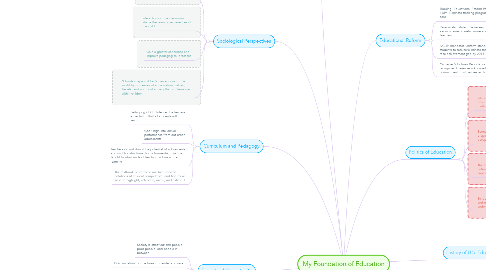My Foundation of Education
by Morgan Roberts

1. Schools as Organizations
1.1. Schools are separate social organizations because: -definite population-clear structure-compact network of social relationships-prevaded by a "we feeling"-own culture
1.2. Teachers are "highly qualified" with: -a college degree -full certificate or licensure -demonstrable content knowledge
1.3. Teachers develop all kinds of classroom strategies that become highly personal & evolve into their own teaching style
1.4. out-of-field-teaching: teachers being assigned to teach subjects that do not match their training or education
2. Curriculum and Pedagogy
2.1. Pedagogy of Confidence: the fearless expectation that all students will learn
2.2. Goal: high intellectual performance from out urban adolescents
2.3. Teachers do not doubt the potential of adolescents and switch instructional focus from--what must be taught to what kinds of teaching will maximize learning
2.4. The textbook is not the curriculum: expand notations of student competence, and find more ways to highlight, celebrate, name, and extend it
3. Equality of Opportunity
3.1. Society is stratified: rich people, poor people, and people in between
3.2. Discrimination: on the basis of gender and race
3.3. Social stratification: hierarchal configuration of families who have differential access to whatever is of value in the society at a given point over time: social variables
3.4. Class, Race, Gender,
4. Educational Inequality
4.1. Functionalists: aim to eliminate structural barriers to educational success
4.2. Student centered: within-school-differences like ability grouping & curriculum tracking
4.3. Conflict theorists: reproduce rather than eliminate inequality
4.4. Serrano vs. Priest: ruled the system of unequal school financing between wealthy and poor districts unconstitutional
5. Sociological Perspectives
5.1. Teachers can learn a great deal from the sociology of education
5.2. Interactions in the classroom shape the learning experiences of the child
5.3. Gain a greater coherence and improve pedagogical practices
5.4. Schools shape children's perceptions of the world by processes of socialization: values, beliefs, and norms of society that is internalized within children
6. Politics of Education
6.1. Intellectual Purposes of Schooling: teach basic cognitive skills like reading, writing, and math.
6.2. Economic Purposes of Schooling: prepare students for their later occupational roles
6.3. The Liberal Perspective: concerned with balancing the economic productivity of capitalism with social and economic needs
6.4. Schools have limited the life chances of the poor and minority children and the problem of underachievement is a critical issue
7. History of U.S. Education
7.1. The Age of Reform:The Rise of the Common School
7.2. Ralph Waldo Emerson: "We are all a little wild here with numberless projects of social reform"
7.3. Education for All: The Emergence of the Public High School
7.4. Cardinal Principles of Secondary Education:1. Health 2. Command of fundamental processes 3. Worthy home-membership 4. Vocation 5. Citizenship 6. Worthy use of leisure 7. Ethical character
8. Philosophy of Education
8.1. Firmly rooted in practice
8.2. Helps teachers in understanding who they are or intend to be
8.3. Helps teachers in understanding why they do or propose what they do
8.4. Idealism
9. Educational Reform
9.1. Tracking: Educational Reform Passow 1989--Eliminate tracking programs for common core
9.2. Passow also stated the necessity to -recruit-train-and -retainmore academically able teachers
9.3. NCLB: mandates uniform standards for all students to reduce/eliminate the social class & race achievement gap by 2014
9.4. Carnegie & Holmes Reports: career ladders that recognize differencesin knowledge, skill and commitment must be created for teachers


